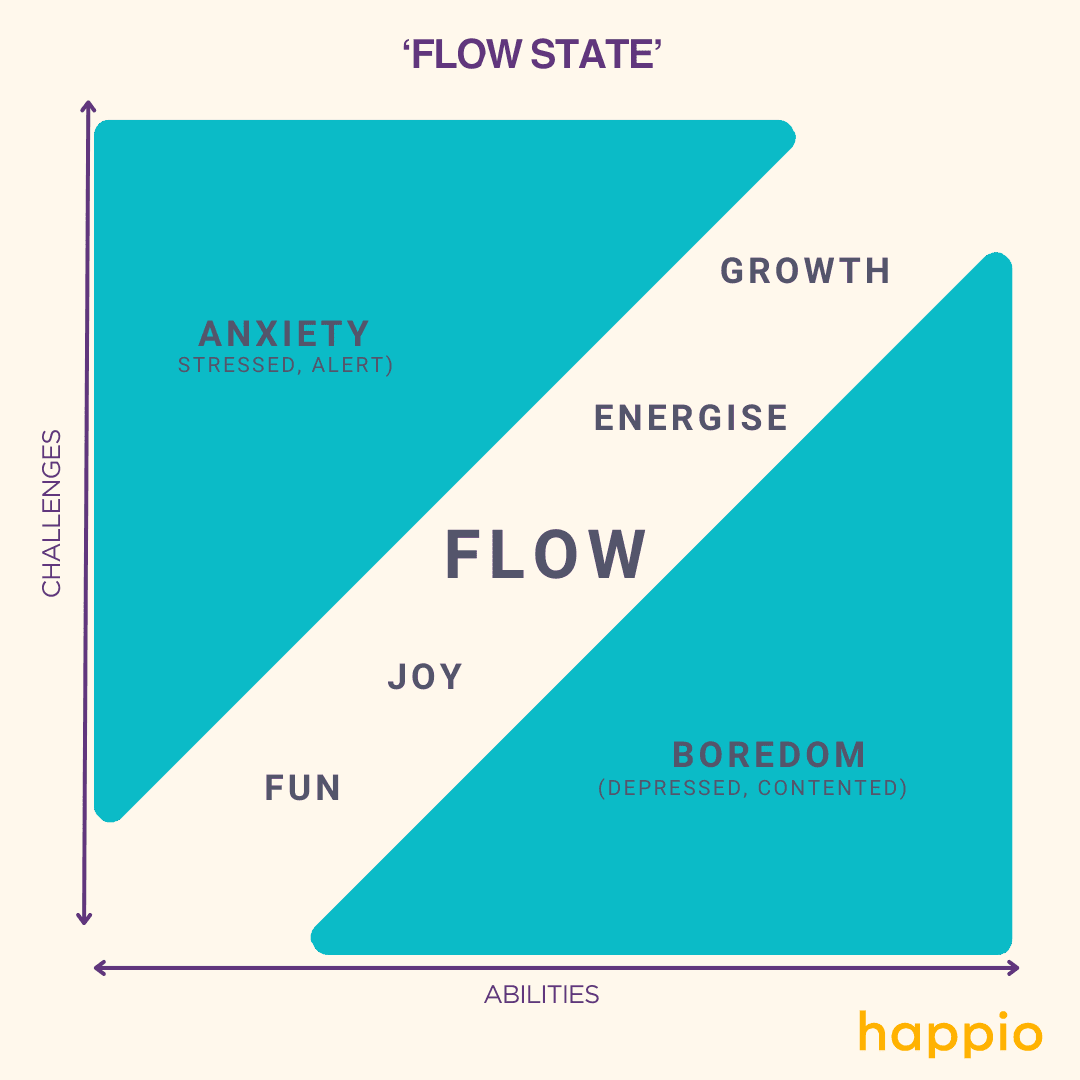🌟 8 Traits of Flow According to Mihaly Csikszentmihalyi 🌟

Want to increase your well-being, creativity, and productivity? If so, cultivate flow, a concept describing those moments when you are completely absorbed in a challenging but doable task.
Mihaly Csikszentmihalyi, considered one of the co-founders of positive psychology, was the first to identify and research flow. (If you are unsure how to pronounce his name, here is a phonetic guide: "Me high? Cheeks send me high!")
"The best moments in our lives are not the passive, receptive, relaxing times . . . The best moments usually occur if a person's body or mind is stretched to its limits voluntarily to accomplish something difficult and worthwhile" (Csikszentmihalyi, 1990).
The experience of flow is universal and has been reported to occur across all classes, genders, ages, and cultures, and it can be experienced during many types of activities. If you had ever heard someone describe a time when their performance excelled and they were "in the zone," they were likely describing an experience of flow. Flow occurs when your skill level and the challenge at hand are equal.
Read on to learn more about flow and how to cultivate it.
Who was Mihaly Csikszentmihalyi? 📚
Csikszentmihalyi became a happiness researcher due to the adversity he faced growing up. He was a prisoner during World War II and witnessed the pain and suffering of the people around him. This experience sparked his curiosity about happiness and contentment.
After the war, Csikszentmihalyi took an interest in art, philosophy, and religion to answer the question: What creates a life worth living? Eventually, he discovered psychology while attending a lecture by Carl Jung at a ski resort in Switzerland. Intrigued by Jung's work, Csikszentmihalyi pursued an education in psychology in the United States, focusing on the causes of happiness.
Finding Out What Happiness Is 🌈
Csikszentmihalyi's studies led him to conclude that happiness is an internal state of being. His famous 1990 book, "Flow: The Psychology of Optimal Experience," posits that experiencing flow can increase happiness. He argues that happiness is not fixed but can be influenced by our actions.
Csikszentmihalyi found that people were most creative, productive, and happy in a flow state. He interviewed athletes, musicians, and artists to understand when they experienced optimal performance and how they felt during those times. Many described their best performances as instances when their work flowed out of them effortlessly.
Flow, according to Csikszentmihalyi, is "a state in which people are so involved in an activity that nothing else seems to matter; the experience is so enjoyable that people will continue to do it even at great cost, for the sheer sake of doing it" (1990).
The 8 Characteristics of Flow 🌊
Csikszentmihalyi describes eight characteristics of flow:
- Complete concentration on the task.
- Clarity of goals and immediate feedback. 🎯
- Transformation of time (speeding up/slowing down). ⏳
- The experience is intrinsically rewarding. 🎉
- Effortlessness and ease. 💫
- There is a balance between challenge and skills.⚖️
- Actions and awareness are merged, losing self-conscious rumination. 🧘
- There is a feeling of control over the task. 🎮
Who Experiences Flow? 🌍
The capacity to experience flow can differ from person to person. Studies suggest that those with autotelic personalities who do things for their own sake rather than for external rewards tend to experience more flow. These individuals typically display high interest in life, persistence, and low self-centeredness.
Research has shown a negative correlation between flow and neuroticism and a positive correlation between flow and conscientiousness (Ullén et al., 2012). Neurotic individuals are more prone to anxiety and self-criticism, which can disrupt flow, while conscientious individuals are more likely to engage deeply in challenging tasks, fostering flow.
What Happens in the Brain During Flow? 🧠
The flow state has been linked to decreased activity in the prefrontal cortex, the brain area responsible for higher cognitive functions like self-reflective consciousness and working memory. In a flow state, this area is believed to temporarily down-regulate, a process known as transient hypofrontality, leading to feelings of time distortion and loss of self-consciousness (Dietrich, 2003).
The inhibition of the prefrontal lobe may allow the implicit mind to take over, promoting creativity. Additionally, flow is associated with the brain's dopamine reward circuitry, enhancing curiosity and engagement (Gruber et al., 2014).
How to Achieve Flow 🌟
To experience flow, one must minimize distractions. Turning off smartphones and other attention-robbers is a good start. Achieving flow requires balancing perceived challenges and skills. Suppose a challenge exceeds one's skills; anxiety results; boredom sets in if skills exceed the challenge. Flow occurs when challenges and skills are balanced (Nakamura et al., 2009).
Do not Flow Alone 🤝
Research from St. Bonaventure University found that students experienced more enjoyment and flow when participating in activities as a team rather than alone (Walker, 2008). Group activities can enhance the flow experience, reinforcing the positive psychology principle that "other people matter" (Peterson).
What is The Motivation Behind Your Flow State? 🌟
Flow is driven by intrinsic motivation—doing something for the sheer love of it. Csikszentmihalyi described the highest form of intrinsic motivation as a flow state where self-consciousness is lost, and one is fully immersed in the moment (2013). Extrinsic motivation, on the other hand, is driven by external rewards and is less sustainable.
Using Images To Boost Confidence And Flow 🖼️
Koehn et al. (2013) found that imagery and confidence are positively associated with flow and performance. Individuals can induce flow states by using mental imagery to boost confidence, enhancing their performance in various tasks.
By embracing these principles, you can cultivate flow daily, enhancing your creativity, productivity, and happiness. 🌟